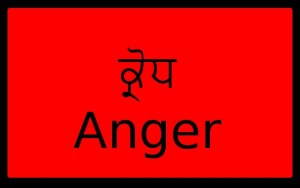Control your anger
Anger or Krodh is rage, ire, wrath, irritation and annoyance. It is one of the five evils mentioned in Gurbani. It is an emotion and also a state of mind. Anger is the feeling of antagonism, and irritation caused by some real or supposed grievance or inadequacy. It can be caused by both external and internal events.
You could be angry at a specific person (such as a co-worker or supervisor) or event (a traffic jam, a canceled flight), or your anger could be caused by worrying or brooding about your personal problems or what someone has said or done, etc. Memories of traumatic or enraging events can also trigger angry feelings.
In the western cultures, it is believed to be a function of our primitive, animalistic-mode inherent self-preservation mechanisms - the confrontational aspect of what is commonly referred to as the 'fight-flight' response. Anger triggers a series of hormonal (endocrinal) changes intended to ready our body and senses for overt physical response to a potentially life-threatening situation.
Anger brings bodily changes
When someone becomes angry, it brings physiological and biological changes to the body; their heart rate usually increases; as does their rate of respiration - which also becomes more laboured. Blood pressure rises, the digestive processes are suspended; and as blood is drawn away from the "non-essential" functions like the liver, stomach and intestines to flow to the more "essential" parts for action like the central nervous system and the muscles.
The individual's skin temperature rises and they may feel flushed. Their muscles tense, they become agitated, restless - to varying degrees, hyperactive. They may find they are grinding their teeth, clenching their fists, they raise their voices, feel like they are 'fit to burst' - but also they may feel that they are somehow stronger than normal, and full of energy. In moments of severe stress, both men and women have lifted automobiles off of people; lifting a weight they could not lift at any other time.
This build up of tension, if not reduced and released can have serious physiological impact on the body. However, it also seems that 'letting it all out' - be it by ranting and raving, punching pillows, or verbally/physically attacking others - also has a detrimental impact on the individual's own body systems.
What Gurbani tells us
"Violence, attachment, greed and anger," says Guru Nanak "are like four rivers of fire. Falling into them, one is burned, O Nanak! One is saved only by holding tight to good deeds" (GG, 147). So anger is compared in Gurbani to a "river of fire" and as we all know, fire is destructive; it burns whatever it touches and brings pain and suffering. Also, once spread, it is difficult to control. So the Guru tells us in this tuk how anger can bring pain and suffering to the person just like fire and also how it is difficult to control anger once it has spread.
Elsewhere the Guru says, "Kam and krodh dissolve the body as borax melts gold" (GG, 932). The Guru gives a clear warning that Kam (excessive desire or lust) and Krodh (anger) "dissolve" the body just like gold is melted when placed in borax. So just like an acid melts away a metal anger can melts away the body. This is an internal process os eating away the health body tissues.
Guru Ram Das, Nanak IV, warns: "Do not meet with, or even approach those people, whose hearts are filled with horrible anger." (GG, 40). The Guru goes as far as asking us to keep away from Sangat {company of people} who cannot control their anger.
How do you control anger
Gurbani tells us that: When "the Name of the Lord dwells within the mind; egotism and anger are wiped away." (SGGS p 33) The importance of simran - the constant remembrance of the Lord, the Creator - will wipe away the state of anger and the feeling of ego from the mind and bring peace and tranquillity. "Krodh is to be vanquished and eradicated". This is done through "humility and firm faith" in the Divine.
Guru Arjan's prescription: "Do not be angry with any one; search your own self and live in the world with humility. Thus, O Nanak, you may go across (the ocean of existence) under God's grace" (GG, 259).
Shaikh Farid, a thirteenth-century Muslim saint whose compositions are preserved in the Sikh Scripture, says in one of his couplets:
"O Farid, do good to him who hath done thee evil and do not nurse anger in thy heart; no disease will then afflict thy body and all felicities shall be thine" (GG, 1381-82).
Righteous indignation against evil, injustice and tyranny is, however, not to be equated with krodh as an undesirable passion. Several hymns in the Guru Granth Sahib, particularly those by Guru Nanak and Kabir, express in strong terms their disapproval of the corruption of their day.
Further, the Guru tels us that: "Lust and anger are brought under control, when the breath does not fly around, wandering restlessly." (SGGS p 1395) - that by controlling our breath and the state of mind, these negative emotions be subdued.
Medical opinion
Various medically qualified experts also give us other physical ways to help us reduce the influence of these "evils of the mind":
- Main article: How To Control Anger
Anger Management
The goal of anger management is to reduce both your emotional feelings and the physiological arousal that anger causes. You can't get rid of, or avoid, the things or the people that enrage you, nor can you change them, but you can learn to control your reactions.
Are You Too Angry?
There are psychological tests that measure the intensity of angry feelings, how prone to anger you are, and how well you handle it. But chances are good that if you do have a problem with anger, you already know it. If you find yourself acting in ways that seem out of control and frightening, you might need help finding better ways to deal with this emotion.
See also
External links
- Anger on Wikipedia
- Gurbani search for the word "Anger"
- Anger Is Destructive by Khyati Raja
- The Effect of Anger by Tyler Woods
- Irrational Anger: Causes
- Just for Today, do not anger.... by James Deacon


